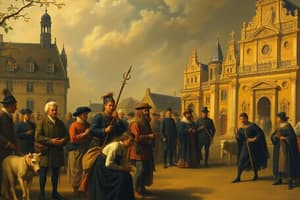Podcast
Questions and Answers
Who assassinated Henry of Guise?
Who assassinated Henry of Guise?
Henry III
Who became Henry IV and started the Bourbon dynasty?
Who became Henry IV and started the Bourbon dynasty?
Henry of Navarre
Who was the wife of Henry II and aimed for a Catholic France?
Who was the wife of Henry II and aimed for a Catholic France?
Catherine de Medici
Who was Mary Queen of Scots married to?
Who was Mary Queen of Scots married to?
What was the significance of the St. Bartholomew's Day Massacre?
What was the significance of the St. Bartholomew's Day Massacre?
Who led the Huguenots during the French Wars of Religion?
Who led the Huguenots during the French Wars of Religion?
Which of the following were considered 'Boy Kings' during the French Wars of Religion? (Select all that apply)
Which of the following were considered 'Boy Kings' during the French Wars of Religion? (Select all that apply)
What was the War of the Three Henrys?
What was the War of the Three Henrys?
Who were the Guises in relation to French religion?
Who were the Guises in relation to French religion?
Can you name one enlightened despot?
Can you name one enlightened despot?
Which enlightened despot believed in making all subjects equal before the law?
Which enlightened despot believed in making all subjects equal before the law?
Maria Theresa embraced religious toleration.
Maria Theresa embraced religious toleration.
Fredrick the Great referred to himself as the ______ of the state.
Fredrick the Great referred to himself as the ______ of the state.
Flashcards are hidden until you start studying
Study Notes
French Wars of Religion (1562-1598) Overview
- The conflict primarily involved power struggles between Catholics and Huguenots (French Calvinists).
- Key factions: Guises (Catholic), Bourbons (Huguenot), and Valois (Royal Family).
Key Figures
-
Henry III
- Assassinated Henry of Guise during political turmoil.
-
Henry of Guise
- Leader of the Catholic faction, used assassinations and military power to control religion.
-
Henry of Navarre (Henry IV)
- Converted to Catholicism to ascend to the throne, famously declared, "Paris is well worth a Mass."
- Set foundation for French Absolutism, emphasizing economic reform and infrastructure development.
- Implemented mercantilist policies, focused on efficient tax collection and administration.
-
Catherine de Medici
- Wife of Henry II, sought to maintain Catholic control without Guises' dominance.
- Influenced policies leading to civil unrest and orchestrated the assassination of Protestant leader Coligny.
- Played a critical role in the St. Bartholomew's Day Massacre.
-
Mary Queen of Scots
- Catholic relative of Protestant Queen Elizabeth I; her marriage to Francis II was politically significant.
- Accused of conspiring against Elizabeth, leading to her execution.
Major Events
-
War of the Three Henrys (1585-1589)
- Civil war driven by the Holy League aiming to prevent Henry of Navarre from taking the throne.
- Significant battles involved the three factions: Henry of Guise, Henry III (Valois), and Henry of Navarre.
-
St. Bartholomew's Day Massacre
- Mass killing of Huguenots, initiated during the wedding festivities of Henry of Navarre.
- Admiral Coligny and thousands of Huguenots were murdered, highlighting the intense religious conflict.
Political Dynamics
-
Guises
- Powerful Catholic family, controlled their own army and influenced the course of civil wars.
-
Bourbons
- Emerged as leaders of the Huguenot factions, notably Henry of Navarre became a significant figure.
Enlightened Despots Context
-
Maria Theresa
- Enlightened policies included educational reforms and attacks on serfdom; however, upheld an absolutist rule with censorship.
-
Joseph II
- Known as the most enlightened ruler; abolished serfdom and promoted religious tolerance, faced resistance due to heavy taxation.
-
Catherine the Great
- Engaged with Enlightenment ideas but maintained her absolutist power, initiated legal reforms and educational opportunities.
-
Frederick the Great
- Balanced enlightenment and absolutism, enacted policies to improve culture and society, yet maintained serfdom and engaged in military conflicts.
Social and Religious Tensions
- Huguenots faced severe oppression, leading to an increased radicalization of Protestantism in France.
- The conflict's legacy shaped French identity, influencing future governance and the evolution of absolutism.
Studying That Suits You
Use AI to generate personalized quizzes and flashcards to suit your learning preferences.




